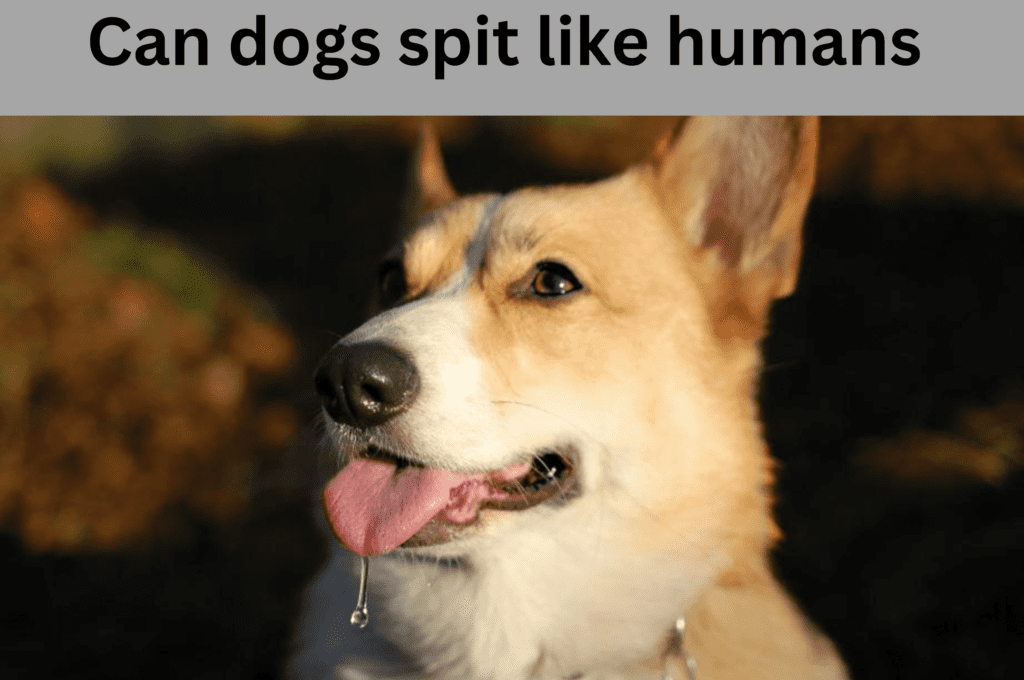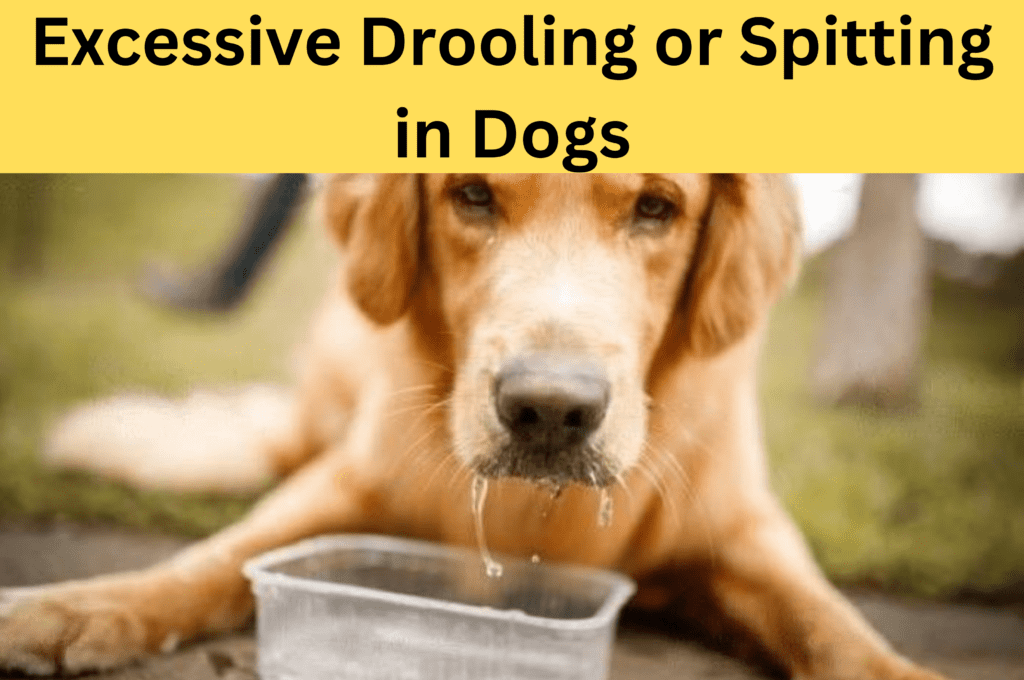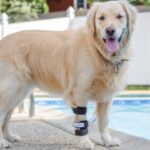Have you ever wondered if dogs can spit like humans do? If you have a dog, you may have noticed that sometimes they drool excessively or make spitting noises. What does this mean? Is it normal or a sign of a health problem? And what are the facts and myths about dog saliva?
In this context, we will answer these questions and more. We will explain can dogs spit? what spitting is and why humans do it, why dogs can’t spit and why they drool, and what are the benefits, risks, and healing properties of dog saliva. We will also provide some practical tips and advice on how to prevent or treat excessive drooling or spitting in dogs.
If you are a dog lover, a pet owner, or a veterinarian, you will find this article interesting and informative. Read on to learn more about whether can dogs spit yes or no? and everything you need to know about dog saliva.
Contents
- 1 Can dogs spit like humans and why do they drool?
- 2 What are the facts and myths about dog saliva?
- 2.1 Fact:
- 2.2 Dog saliva contains antibacterial microorganisms, enzymes, and antibodies that can help heal wounds and fight infections.
- 2.3 Myth:
- 2.4 Dog saliva is cleaner than human saliva or water.
- 2.5 Myth:
- 2.6 Dog saliva has healing properties that can cure human ailments.
- 2.7 Fact:
- 2.8 Dog saliva differs from human saliva in terms of composition, pH, and enzymes.
- 2.9 Myth:
- 3 How to prevent or treat excessive drooling or spitting in dogs’ mouths?
- 4 Conclusion
- 5 FAQs About Can Dogs Spit?
Can dogs spit like humans and why do they drool?
Unlike humans, dogs cannot spit like we do. This is because they lack the lip control and muscle coordination that are necessary for spitting. Dogs have loose and floppy lips that prevent them from forming a tight seal around their mouth.
They also have a different tongue structure and movement that make it difficult for them to eject saliva or other substances from their mouth.
However, dogs can drool, which is the production and accumulation of saliva in the mouth. Drooling is a normal and natural behavior for dogs, and it has several functions and causes, such as:
- To lubricate their food and aid digestion. Dogs produce more saliva when they smell, see, or taste food, as saliva helps them swallow and digest their food. Saliva also contains enzymes that break down food and prevent tooth decay.
- To regulate their body temperature. Dogs do not sweat like humans do, so they rely on panting and drooling to cool themselves down. When dogs pant, they evaporate water from their tongue and mouth, which lowers their body temperature. Drooling also helps them lose heat through evaporation.
- To show submission. Dogs use body language and vocalization to communicate with other dogs and humans. Drooling can be a sign of submission, respect, or appeasement, especially when dogs are in the presence of a dominant or aggressive dog or person. Drooling can also indicate fear, anxiety, or stress in some situations.
- To indicate a health problem. Sometimes, drooling can be a symptom of a medical condition, such as dental problems, allergies, infections, or foreign objects in the mouth. Drooling can also be a side effect of some medications, vaccines, or toxins. If your dog is drooling excessively or abnormally, you should check their mouth for any signs of injury, irritation, or obstruction, and consult a veterinarian if necessary.
Drooling can vary depending on the breed, size, and shape of the dog. Some dogs drool more than others, especially those with large or flat heads, such as mastiffs, bulldogs, or boxers. These dogs have more skin folds around their mouth, which create pockets that collect saliva. Other dogs drool less, such as poodles, terriers, or chihuahuas. These dogs have smaller or longer heads, which allow them to swallow their saliva more easily.

What is spitting and why do humans do it?
Spitting is the act of ejecting saliva or other substances from the mouth. Humans spit for various reasons, such as:
- To get rid of something unwanted, such as food particles, dirt, or insects.
- To express disgust, anger, or contempt, such as spitting on someone or something.
- To communicate, such as spitting to make a sound or a gesture.
- To clean the mouth, such as spitting after brushing the teeth or rinsing the mouth.
Spitting is a voluntary and conscious action that requires lip control and muscle coordination. Humans can spit in different ways, such as blowing, spraying, or dribbling. The amount and force of spitting can vary depending on the situation and the intention.
Spitting is considered a normal and acceptable behavior in some cultures and contexts, such as sports, medicine, or religion. However, spitting is also regarded as a rude and offensive behavior in many other cultures and contexts, such as public places, social interactions, or hygiene.
Spitting can also pose health risks, such as spreading diseases or infections through saliva. Therefore, spitting should be done with caution and respect.
Get More Information to Know the Pets Behaviors
Why Is My Dog Obsessed with My Belly Button?
What are the facts and myths about dog saliva?
Dog saliva is a complex and fascinating substance that has many functions and properties. However, there are also many beliefs and misconceptions about dog saliva that may not be true or accurate. Here are some of the common facts and myths about dog saliva, and what the science says about them.
Fact:
Dog saliva contains antibacterial microorganisms, enzymes, and antibodies that can help heal wounds and fight infections.
Dog saliva has been shown to inhibit the growth of some bacteria, such as staphylococcus, streptococcus canis, or E. coli. Dog saliva also contains lysozyme, lactoferrin, and immunoglobulin A, which are enzymes and antibodies that can destroy bacteria and protect against infection.
Myth:
Dog saliva is cleaner than human saliva or water.
Dog saliva is not sterile or pure, and it can contain harmful bacteria, viruses, fungi, or parasites that can cause diseases or infections in humans or other animals.
Dog saliva can also transmit zoonotic diseases, which are diseases that can be passed from animals to humans, such as rabies, leptospirosis, or ringworm.
Myth:
Dog saliva has healing properties that can cure human ailments.
Dog saliva may have some beneficial effects on wound healing and infection prevention, but it is not a miracle cure for human diseases or conditions.
There is no scientific evidence that dog saliva can treat or cure cancer, diabetes, arthritis, or any other human ailment. Dog saliva may also have negative effects on human health, such as causing allergies, infections, or inflammation.
Fact:
Dog saliva differs from human saliva in terms of composition, pH, and enzymes.
Dog saliva and human saliva have different chemical and physical characteristics that reflect their different functions and needs. Dog saliva is more alkaline than human saliva, with a pH of around 7.5 to 8, while human saliva has a pH of around 6.5 to 7 .
Dog saliva also contains more calcium, phosphate, and bicarbonate than human saliva, which help neutralize acids and protect the teeth . Dog saliva also has different types and amounts of enzymes than human saliva, such as amylase, maltase, and lipase, which help digest starch, maltose, and fat.
Myth:
Dog saliva is good for human skin and hair.
Dog saliva may have some moisturizing and antibacterial effects on human skin and hair, but it is not a substitute for proper hygiene and care. Dog saliva can also cause irritation, inflammation, or infection on human skin and hair, especially if there are cuts, wounds, or allergies.
Dog saliva can also leave stains, odors, or residues on human skin and hair, which can be unpleasant or unhygienic. These are some of the facts and myths about dog saliva that you should know.
Dog saliva is a remarkable and useful substance for dogs, but it is not always beneficial or harmless for humans. Therefore, you should be careful and respectful when dealing with dog saliva, and always consult a doctor or a veterinarian if you have any concerns or questions.
How to prevent or treat excessive drooling or spitting in dogs’ mouths?
If your dog is drooling or spitting more than usual, you may want to find out the cause and take some measures to prevent or treat it. Here are some practical tips and advice on how to deal with your dog’s drooling or spitting issues:
Check for dental problems
One of the most common causes of excessive drooling or spitting in dogs’ mouths is dental disease, such as tooth decay, tartar buildup, gum infection, or tooth abscess. These conditions can cause pain, inflammation, and bad breath in your dog, and may also affect his appetite and general health.
To prevent or treat dental problems, you should brush your dog’s teeth daily, provide him with dental chews or toys, and visit your veterinarian regularly for dental checkups and cleaning.
Check for allergies
Another possible cause of excessive drooling or spitting in dogs is allergies, such as food allergies, environmental allergies, or contact allergies. These allergies can cause itching, swelling, and irritation in your dog’s mouth, throat, or skin, and may also trigger other symptoms, such as sneezing, coughing, or scratching.
To prevent or treat allergies, you should identify and avoid the allergens that trigger your dog’s reaction, provide him with antihistamines or steroids as prescribed by your veterinarian, and use hypoallergenic products for his grooming and bedding.
Check for infections
A third possible cause of excessive drooling or spitting in dogs is infections, such as bacterial, viral, fungal, or parasitic infections. These infections can affect your dog’s mouth, throat, or other organs, and may also cause fever, lethargy, or loss of appetite in your dog.
To prevent or treat infections, you should keep your dog’s vaccinations and deworming up to date, monitor his symptoms and behavior, and consult your veterinarian for diagnosis and treatment.
Check for foreign objects
A fourth possible cause of excessive drooling or spitting in dogs is foreign objects, such as bones, sticks, toys, or plants. These objects can get stuck in your dog’s mouth, gums, or teeth, and cause pain, bleeding, or obstruction in your dog.
To prevent or treat foreign objects, you should inspect your dog’s mouth regularly, remove any objects that you find, and avoid giving your dog anything that can break or splinter easily.
Keep your dog hydrated
A fifth possible cause of excessive drooling or spitting in dogs is dehydration, which can occur due to hot weather, exercise, or illness. Dehydration can affect your dog’s saliva production and consistency, and make it more thick and sticky.
To prevent or treat dehydration, you should ensure your dog has access to fresh water at all times, especially during hot weather or after exercise. To encourage your dog to drink water and lessen drooling, you may also dip some ice cubes into the dish.
Use a drool bib
A sixth possible cause of excessive drooling or spitting in dogs is breed, size, or shape. Some dogs drool more than others, especially those with large or flat heads l, such as mastiffs, bulldogs, or boxers. These dogs have more skin folds around their mouth, which create pockets that collect saliva. To prevent or treat drooling due to breed, size, or shape, you can use a drool bib, which is a cloth or towel that you can attach to your dog’s collar or harness, and that can absorb and wipe away the excess saliva.
Consult a veterinarian
A seventh possible cause of excessive drooling or spitting in dogs is an underlying condition, such as a neurological disorder, a hormonal imbalance, or a tumor. These conditions can affect your dog’s salivary glands, nerves, or muscles, and cause abnormal or excessive saliva production or secretion.
To prevent or treat drooling due to an underlying condition, you should consult a veterinarian as soon as possible, as some of these conditions can be serious or life-threatening. Your veterinarian can perform a physical examination, blood tests, x-rays, or other diagnostic tests, and prescribe the appropriate medication, surgery, or therapy for your dog .
These are some of the ways to prevent or treat excessive drooling or spitting in dogs. By following these tips and advice, you can help your dog stay healthy and happy, and avoid any problems or complications caused by drooling or spitting.
Remember, drooling is a normal and natural behavior for dogs, but it can also be a sign of a health problem. Therefore, you should always pay attention to your dog’s drooling or spitting, and seek professional help if needed.

Conclusion
In this article, we have learned about whether can dogs spit? and everything you need to know about dog saliva. We have explained what spitting is and why humans do it, why dogs cannot spit and why they drool, and what are the facts and myths about dog saliva.
We have also provided some practical tips and advice on how to prevent or treat excessive drooling or spitting in dogs. We hope you have found this article interesting and informative. If you are a dog lover, a pet owner, or a veterinarian, you may want to share this article with your friends, family, or colleagues.
If you have any questions, comments, or feedback, please feel free to leave them below. We would love to hear from you and help you with your dog-related issues. Thank you for reading and have a great day with your furry friend!
FAQs About Can Dogs Spit?
Q: Can dogs spit like humans do?
- A: No, dogs cannot spit like humans do. This is because they lack the lip control and muscle coordination that are necessary for spitting. Dogs have loose and floppy lips that prevent them from forming a tight seal around their mouth. They also have a different tongue structure and movement that make it difficult for them to eject saliva or other substances from their mouth.
Q: Why do dogs drool and what does it mean?
- A: Dogs drool for various reasons, such as to lubricate their food and aid digestion, to regulate their body temperature, to show submission, or to indicate a health problem. Drooling is a normal and natural behavior for dogs, and it has several functions and causes. However, if your dog is drooling excessively or abnormally, you should check their mouth for any signs of injury, irritation, or obstruction, and consult a veterinarian if necessary.
Q: Is dog saliva cleaner than human saliva or water?
- A: No, dog saliva is not cleaner than human saliva or water. Dog saliva is not sterile or pure, and it can contain harmful bacteria, viruses, fungi, or parasites that can cause diseases or infections in humans or other animals. Dog saliva can also transmit zoonotic diseases, which are diseases that can be passed from animals to humans, such as rabies, leptospirosis, or ringworm.
Q: Does dog saliva have healing properties that can cure human ailments?
- A: No, dog saliva does not have healing properties that can cure human ailments. Dog saliva may have some beneficial effects on wound healing and infection prevention, but it is not a miracle cure for human diseases or conditions. There is no scientific evidence that dog saliva can treat or cure cancer, diabetes, arthritis, or any other human ailment. Dog saliva may also have negative effects on human health, such as causing allergies, infections, or inflammation.
Q: How can I prevent or treat excessive drooling or spitting in dogs?
- A: You can prevent or treat excessive drooling or spitting in dogs by following some practical tips and advice, such as checking for dental problems, allergies, infections, or foreign objects, keeping your dog hydrated, using a drool bib, or consulting a veterinarian. By following these tips and advice, you can help your dog stay healthy and happy, and avoid any problems or complications caused by drooling or spitting.




